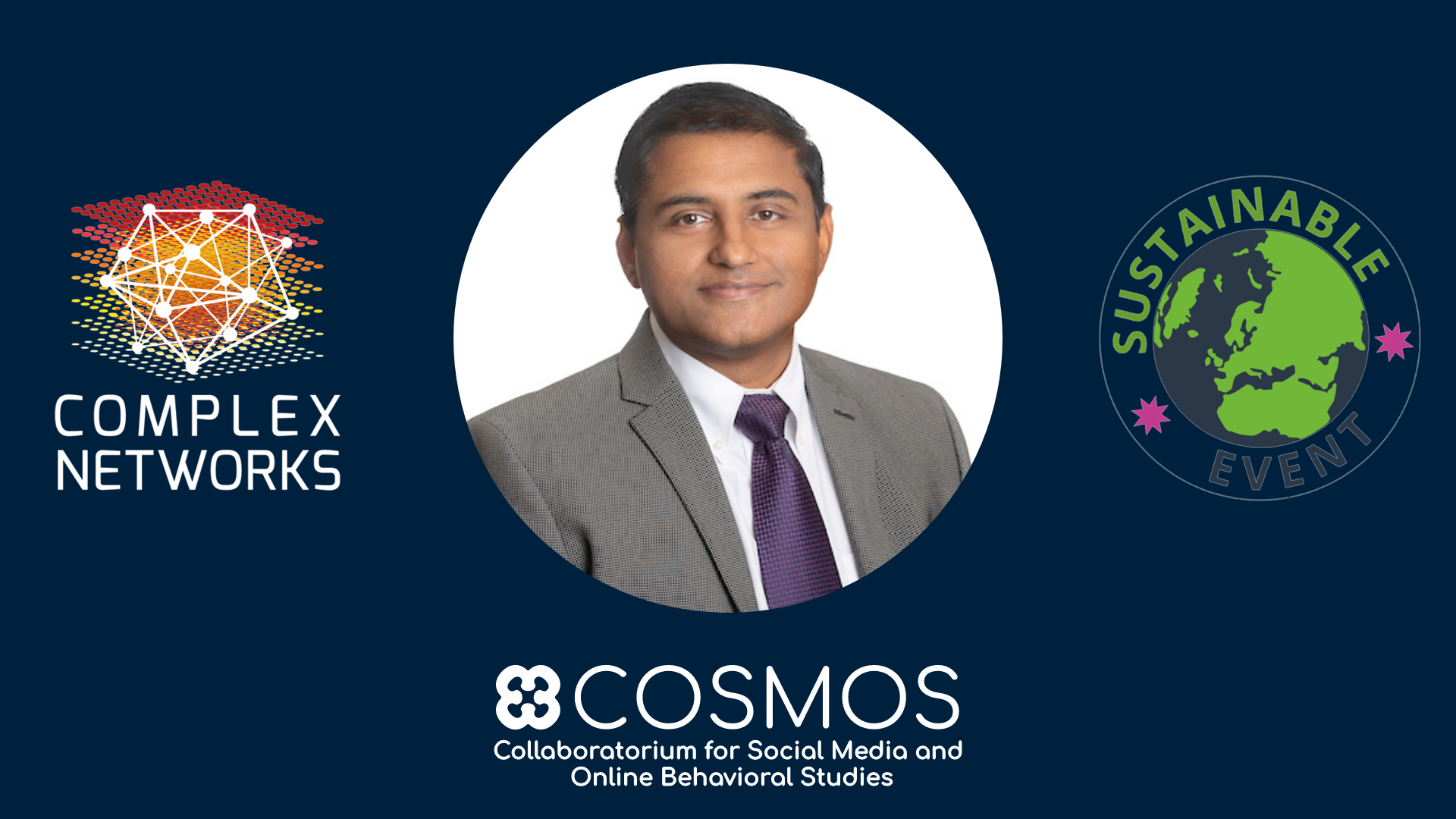The 12th International Conference on Complex Networks was held on 28–30 November 2023 at the French Riviera France. Complex Networks is an international conference that aims at bringing together researchers from different scientific communities working on areas related to complex networks. It is made of two types of contributions: theoretical developments arising from practical problems, and case studies where methodologies are applied. These contributions aim at stimulating the interaction between theoreticians and practitioners.

This year, submissions were across a range of exciting topics like link prediction, graph signal processing, network neuroscience, networks, smart cities and smart grids, and many more.
The following studies were accepted and presented at the conference:
- Ifeanyichukwu Umoga, Stella Mbila-Uma, Mustafa Alassas, and Nitin Agarwal, presenting their paper Analyzing Blogs about Uyghur Discourse using Topic-Induced Hyperlink Networks
- Niloofar Yousefi, Nahiyan Bin Noor, Billy Spann, and Nitin Agarwal, presenting their paper Examining Toxicity’s Impact on Reddit Conversations
- Mert Can Cakmak, Obianuju Okeke, Ugochukwu Onyepunuka, Billy Spann, and Nitin Agarwal, presented their paper Investigating Bias in YouTube Recommendations: Emotion, Morality, and Network Dynamics in China-Uyghur Content
- Mustafa Alassad, Nitin Agarwal, and Lotenna Nwana, presenting their paper Uncovering Latent Influential Patterns and Interests on Twitter Using Contextual Focal Structure Analysis Design
- Mustafa Alassad, and Nitin Agarwal, presenting their paper Focal Structures Behavior in Dynamic Social Networks
- Abiola Akinnubi, Mustafa Alassad, Nitin Agarwal, and Ridwan Amure, presenting their paper Identifying Contextualized Focal Structures in Multisource Social Networks by Leveraging Knowledge Graphs
“Having six of our studies accepted and presented at the premier social network analysis conference such as Complex Networks is a matter of great pride for COSMOS”, said Dr. Agarwal. “I am extremely proud of cosmographers and thrilled to support their participation. Participating in such forums not only provides feedback from experts in the discipline to further advance our research studies but also tremendous networking opportunities for our students for all-round professional growth.”
Niloofar Yousefi gave insight into her paper titled Examining Toxicity’s Impact on Reddit Conversations, saying:
“It addresses a growing issue, the rise of harmful content like toxic language and hate speech on social media. While attempts have been made to counteract this, it remains challenging to stop its impact on people and communities. Our approach dives into Reddit data, using a tree structure to dig into how toxic content affects online conversations. We’ve applied machine learning to classify the toxicity of each leaf node based on its parent and grandparent nodes, as well as the overall tree’s average toxicity. Furthermore, we’re exploring how frequently Reddit conversations conclude with toxic comments. Our methodology helps policymakers catch early signs of trouble and steer harmful comments away from causing damage. This research provides a comprehensive analysis of toxicity on social media platforms and a deeper exploration of the impact of toxic content on individual communities.”
Stella Mbila-Uma also shared how eye-opening her search in Analyzing Blogs about Uyghur Discourse using Topic-Induced Hyperlink Networks was, as it investigated the issue of human rights violations against the Uyghur Muslims by the Chinese government. She tells us:
“…that much information about this issue is available on blogs and social media, providing an alternative perspective to traditional media outlets. However, there is a need for a systematic approach to analyze this information, particularly the spread of information through hyperlinks in Uyghur-related blog posts in the Indo-Pacific region. The paper analyzed 318 blog posts and 5,598 hyperlinks published from January 2019 to September 2022. Utilizing topic modeling and toxicity analysis to identify the main topics in each blog post and their toxicity trends. The topics generated from the topic modeling were mapped onto a network of hyperlinks to develop a topic-induced network. The investigation into core links associated with different topics revealed a mix of relevance regarding the Uyghur discourse. The investigation further corroborated Mehrigul Tursun’s allegations against the Chinese government, finding significant media coverage supporting her claims about Uyghur detention and mistreatment. The topic-induced network helped examine, analyze, and visualize the network of blog hyperlinks and revealed influential blog conduits raising awareness about the oppression of the Uyghur community. This research could guide efforts to raise awareness and address the human rights violations against the Uyghur community.”
Abiola Akinnubi gave insights into his work on Identifying Contextualized Focal Structures in Multisource Social Networks by Leveraging Knowledge Graphs, he explained, saying:
“Social media and online public platforms generate a significant amount of data through user discussions on topics of interest and various social issues that make the news, however, there is a longstanding challenge in modeling knowledge graphs using multi-source social network data, especially for studying online information campaigns. Furthermore, no research has been conducted on contextualizing or identifying contextual focal structures from the modeled knowledge graphs derived from multi-source data.
“KG-CFSA was proposed as an approach to model a knowledge graph using multi-source social network data. Our goal is to identify and contextualize the focal structures created by entities, topics, themes, and documents from online social network data. This approach was applied to analyze data from the Indo-Pacific region in order to discover interesting information campaigns or online campaigns associated with the region across multiple platforms.”
